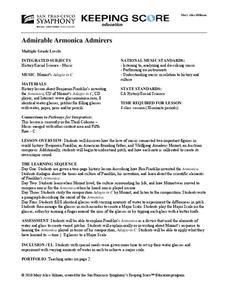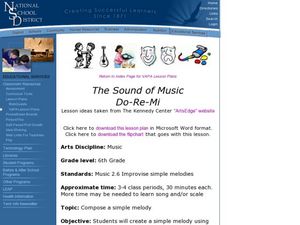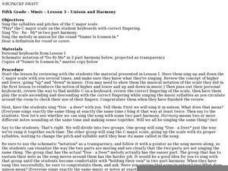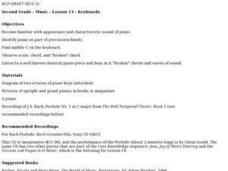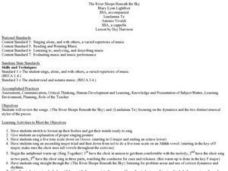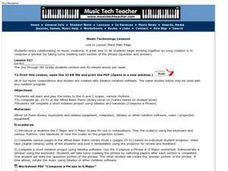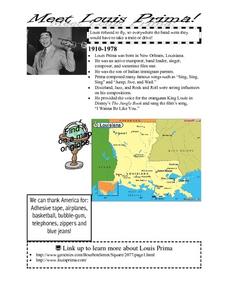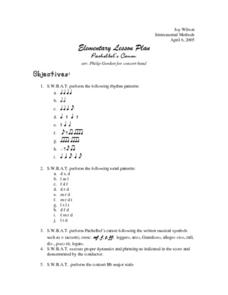San Francisco Symphony
The American Five - Pentatonic scales in early American melodies
Through vocal warm-ups and exercises, budding musicians will attempt to grasp the five pentatonic scales, commonly used in early American songs. They'll sing and work to identify the pitch, tone, melody, and scales being expressed in the...
San Francisco Symphony
Admirable Armonica Admirers
What do Ben Franklin and Wolfgang Mozart have in common? Find out about the musical invention, the armonica or glassy-chord. Learners will read about how Ben Franklin invented this new instrument and how Wolfgang Mozart came to play it....
Curated OER
The Sound of Music: Do-Re-Mi
Seventh graders create a simple melody using the Solfedge syllables. In this melody lesson plan, 7th graders watch the movie The Sound of Music and focus on the "Do Re Mi" clip. Students examine solfege syllables and create a melody...
Curated OER
Lines & Spaces; Another Round
Fourth graders recall the letter names of the notes of the C-major scale and identify the names of the C-major scale. They identify the names of the lines and spaces on a music staff. They sing rounds.
Curated OER
Ravel String Quartet in F Major, First Movement 1903
In this music worksheet, students examine sonata format by looking at various pieces of Ravel's Quartet in F major. They anser question about each section of music and write an essay base on the given quotation.
Curated OER
Fifth Grade Music: Lesson 3 - Unison and Harmony
Fifth graders sing the syllables and pitches of the C major scale, and sing Do - Re - Mi in two-part harmony. They discuss the definition for round and canon, and contrast gamelan music of the Spice Islands with reggae from Jamaica.
Fun Music Company
Working Out the Key
"Gimme an E minor!" Or any key for that matter. But how do you figure out the key of a piece of music? Here's a worksheet that shows young musicians three easy steps to help them identify the key of a piece of music.
Curated OER
Illustration # 5: Phone Number Melodies
Fourth graders create their own melodies by making up a phone number with the numbers of the C major scale (the number 9 will be played by double the C at an octave. Students are encouraged to end their piece with V, I progression in...
Curated OER
Music
Third graders incorporate two formal music lessons into the core curriculum. They study whole notes and rests, syllables of the musical scale and practice singing.
Curated OER
Music Technology
Pupils practice using keyboard and sequencing software to expand their compositions. They use the notes in the C Major Scale and playback their song written in an ABA song form. They complete pages in a basic piano workbook and discuss...
Curated OER
KEYBOARDS
Second graders become familiar with appearance and characteristic sound of piano, identify piano as part of percussion family, find middle C on the keyboard, observe scale, chord, and "broken" chord, and listen to a well-known classical...
Curated OER
How Do I Measure Up? (Intermediate)
Fifth graders compare the relationship between meter in music and measurement in math. They practice sightreading music by determining the number of beats per measure, clapping and counting the rhythm.
Curated OER
Music Elements For Second Grade
Second graders are exposed to a variety of attributes of melody in seven lessons of this unit. the notation in treble clef, pitch, and the movements of the melody are presented in these lessons.
Curated OER
Pitch, Intonation, Harmonic Theory
Young scholars listen to pitches and determine if they are in tune, flat or sharp. Using Aurelia computer software and playing as a band, students practice pitch theory, and play two-octave major scales. They practice and discuss how...
Curated OER
Making CD's from MIDI Compositions
Students complete their own composition (ABA song form, C Major scale, 32-60 measures) using the keyboard and sequencing software on the computer to playback the song. They fill in answers in their workbooks and watch how to transfer...
Curated OER
The River Sleeps Beneath The Sky
High schoolers practice singing "The River Sleeps Beneath the Sky" by Mary Lynn Lightfoot and "Laudamus Te" by Antonio Vivaldi in an SSA choir setting in this Choral lesson for High Schoolers. Emphasis is placed on National Standards for...
Curated OER
Melodic Variation
Students participate in activities in which they apply various techniques of melodic variation. After reviewing sheet music for the song "Marianne", they compare lines 1 & 3, then 2 & 4 and discuss the variations in the song. ...
Curated OER
H1 Classic Presents: Paul McCartney: Chaos and Creation in the Backyard, Lesson 2
Students are introduced to the various songwriting techniques of Paul McCartney. They explore and compare the basic melodic, harmonic, and lyrical tendencies of the different types of pop music.
Curated OER
Music Creations
Learners practice playing notes on the G and C scales in different rhythms. They complete worksheets and discuss the answers. They finish a short notation project as well.
Curated OER
Meet Louis Prima!
Learners discover the difference in major and minor tonality after a brief introduction to Louis Prima. They discuss swing dancing and Louis Prima's role in the "Jungle Book" as the character King Louis. Students listen to the song...
Curated OER
Chords and Triads
In this music worksheet, students answer 15 questions related to chords and triads. For example, "A triad is a ...that is made up of three notes."
Curated OER
Three Pieces for Chamber Orchestra, Movements 1 & 2 By Arnold Schoenberg
Students study composer, Arnold Schoenberg. They compare landscapes to soundscapes and study abstract art and abstract music. They answer questions and write about both in their journals. They identify abstract artist and composers...
Curated OER
Chords and Triads
In this chords and triads music worksheet, students respond to 7 fill in the blank and short answer questions pertaining to the playing of chords and triads.
Curated OER
Pachelbel's Canon
High schoolers warm up by playing rhythm and tonal patterns. They perform Pachelbel's canon and recognize written musical symbols such as cres., leggero, arco, Grandioso, allegro vivo, rall, div, poco rit, and legato. As the band...
Other popular searches
- Music, Major Scale
- Music Theory Major Scale
- Music Major Scales
- Teaching Major Scale Music
- Composing Major Music Scales



